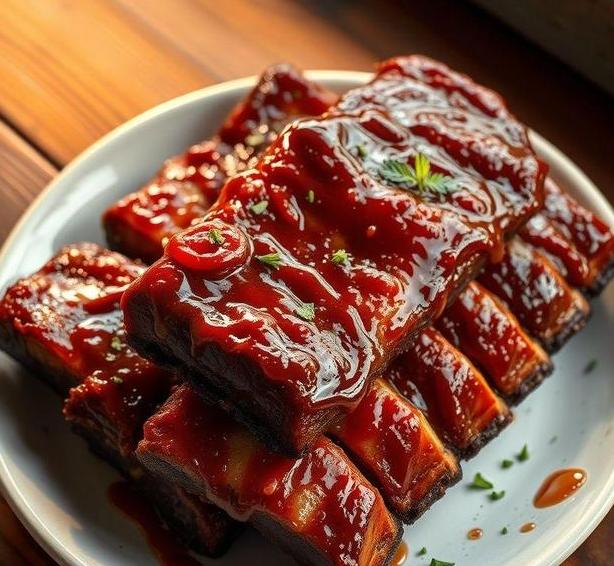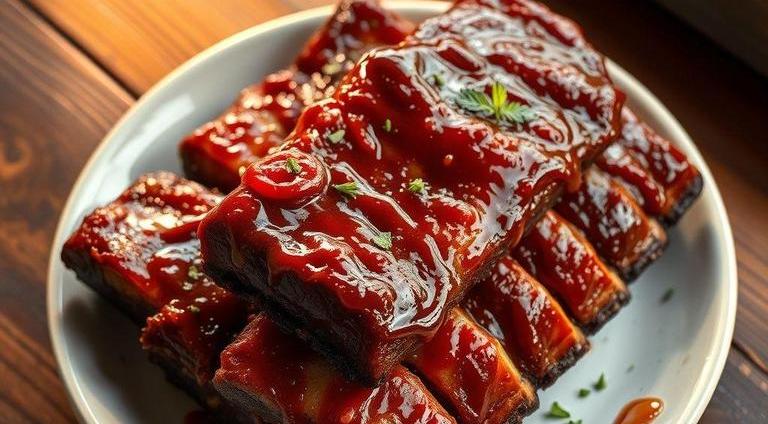Ribs are a beloved dish around the world, offering a tender, flavorful, and smoky experience when cooked just right. Whether you’re preparing them on the grill for a summer BBQ, roasting them in the oven, or smoking them low and slow, ribs are often at the heart of any gathering. However, like any fresh meat, ribs have a shelf life, and knowing how to properly store them and recognize when they’ve gone bad can save you from wasting food or, worse, dealing with foodborne illness. So, what exactly happens when ribs go bad? How long can you keep them before they start to spoil? And what should you do to store them for the best results? In this guide, we’ll dive deep into all things related to the storage, shelf life, and spoilage signs of ribs. Grab a snack, because we’re about to dig into all the meaty details!
Can Ribs Go Bad?
Absolutely, ribs can go bad just like any other type of meat. Fresh ribs are rich in proteins and moisture, making them a perfect environment for bacteria to grow if not stored properly. Ribs, whether pork or beef, can go bad for several reasons, including improper handling, temperature fluctuations, or just simply being kept too long in the fridge or freezer.
What Makes Ribs Spoil?

- Bacteria Growth: Ribs, like any raw meat, can be contaminated by harmful bacteria like Salmonella, E. coli, and Listeria. These bacteria thrive at temperatures above 40°F, and if left unchecked, they can multiply rapidly, leading to spoilage.
- Enzyme Activity: Enzymes naturally present in meat can break down the muscle fibers and tissues over time. This enzymatic activity can lead to off-flavors, texture changes, and a decline in quality.
- Moisture Loss: Ribs that aren’t stored properly can dry out, which doesn’t just affect their texture but can also lead to rancidity when fats start breaking down.
Shelf Life For Ribs
Understanding the shelf life of ribs is crucial to ensuring you’re cooking them when they’re still safe and delicious to eat. The shelf life varies depending on how the ribs are stored and whether they are raw or cooked.
Raw Ribs
- Refrigerated (raw): If stored properly in the fridge at or below 40°F, raw ribs typically last about 3 to 5 days. After this time, the risk of spoilage increases, and they should not be consumed.
- Frozen (raw): If you’re not planning to cook your ribs within a few days, freezing them is a great option. Raw ribs can last for 4 to 6 months in the freezer without losing much of their quality. However, they are still safe to eat beyond this period if kept frozen at 0°F or lower.
Cooked Ribs
- Refrigerated (cooked): After cooking, ribs should be stored in an airtight container in the refrigerator and can last 3 to 4 days.
- Frozen (cooked): If you’re making extra ribs, they can be frozen for 2 to 3 months. After that, they may still be safe to eat but will lose flavor and texture.
Common Signs Of Spoilage

Ribs can sometimes look, smell, and feel a little off even before they reach their "expiration" date. Here’s a detailed breakdown of how to spot spoiled ribs:
Smell
- Off-putting or sour smell: Fresh ribs will have a mild, meaty aroma, but if they smell sour, tangy, or like ammonia, it’s a red flag. These are signs that bacteria or spoilage is taking place.
- Putrid odor: An overwhelmingly strong, rotten smell indicates that your ribs are no longer safe to eat.
Color
- Gray or brown discoloration: Fresh ribs are usually pinkish-red in color. If they start turning a dull gray, brown, or develop a greenish tint, it’s a sign that spoilage has begun.
- Slimy texture: A slimy surface can be caused by bacteria or mold growth. This is usually accompanied by an off smell and indicates the meat is no longer safe.
Texture
- Sticky or tacky feel: Fresh ribs should feel firm and moist but not sticky. If they feel slimy or overly tacky, they’ve likely gone bad.
- Dryness: If the meat has dried out and becomes hard to the touch, it’s an indication that it may not be safe or desirable to cook anymore.
Expiration Date (for Packaged Ribs)
- Always check the expiration or “use by” date if the ribs are pre-packaged. Even if the ribs still look fine, if they are past the expiration date, it’s best to err on the side of caution and discard them.
How To Store Ribs?
Storing ribs properly ensures they stay fresh for as long as possible while also reducing the risk of contamination or spoilage. Whether you’re dealing with raw or cooked ribs, follow these tips for the best results:
For Raw Ribs
- Refrigeration: Store your raw ribs in the coldest part of the fridge, which is usually the back of the bottom shelf. Make sure they’re in an airtight container or tightly wrapped in plastic wrap or aluminum foil to prevent contamination and moisture loss.
- Freezing: If you plan to freeze your raw ribs, wrap them in plastic wrap or freezer paper, followed by a layer of aluminum foil or a vacuum-sealed bag. This double wrapping helps prevent freezer burn and keeps the ribs fresher longer. Don’t forget to label them with the date!
For Cooked Ribs
- Refrigeration: Allow cooked ribs to cool to room temperature (but no longer than 2 hours) before storing them in the fridge. Use airtight containers or wrap them tightly with foil or plastic wrap to lock in moisture and prevent bacterial growth.
- Freezing: To freeze cooked ribs, slice them into portions and wrap each piece tightly. Place them in freezer bags or airtight containers for the best protection. Again, don’t forget to label and date.
General Tips For Both Raw And Cooked Ribs
- Keep ribs away from raw foods: To prevent cross-contamination, store ribs in their own separate space in the fridge or freezer, away from raw vegetables or ready-to-eat foods.
- Use a thermometer: Ensure your refrigerator stays at or below 40°F and your freezer is at 0°F to minimize bacteria growth and keep your meat safe.
- Don’t leave ribs at room temperature: As tempting as it may be to let them sit out while you prep or serve, ribs shouldn’t be left at room temperature for more than 2 hours (1 hour if the temperature is above 90°F). This is when bacteria like Salmonella and E. coli can multiply quickly.
Expert Tips
Here are a few expert tips to maximize the shelf life and quality of your ribs:
- Vacuum Sealing: If you want to keep your ribs in the best condition for longer periods, consider vacuum-sealing them. This method removes air and moisture, greatly extending both the freshness and shelf life of your meat.
- Marinades and Seasoning: Marinating ribs before freezing them is a great way to infuse flavor while also preserving their freshness. Make sure to store them in the marinade in a sealed bag or container.
- Thawing: Always thaw frozen ribs in the refrigerator, not on the counter. Thawing in cold water or using the microwave is an option, but they should be cooked immediately afterward.
- Don’t Refreeze: Once thawed, never refreeze ribs. Freezing and thawing multiple times can degrade both the texture and flavor.
FAQs
Can Ribs Go Bad If Left Out At Room Temperature?
Yes, ribs can go bad if left out at room temperature for more than 2 hours. Bacteria grow rapidly at temperatures between 40°F and 140°F, which can lead to foodborne illness. It’s best to refrigerate or freeze ribs within this time frame.
How Long Do Cooked Ribs Last In The Fridge?
Cooked ribs can last for up to 3-4 days in the fridge if stored in an airtight container. After this time, the risk of bacterial growth increases, and the quality of the meat declines.
Can Ribs Go Bad In The Freezer?
Ribs can be stored in the freezer for up to 4-6 months. While they won’t necessarily spoil after this period, the quality, taste, and texture may begin to degrade. It’s important to wrap them tightly in plastic wrap or foil and then place them in a freezer bag to prevent freezer burn.
How Can You Tell If Ribs Have Gone Bad?
Ribs that have gone bad will have a sour or off smell, a slimy texture, or a discolored appearance (such as a grayish or greenish tint). If there’s any mold present, the ribs should be discarded immediately.
Can I Eat Ribs That Have Been In The Fridge For A Week?
No, it’s not safe to eat ribs that have been in the fridge for more than 4 days. After this time, the risk of bacterial contamination increases significantly, even if the ribs look and smell fine.
What Happens If I Eat Spoiled Ribs?
Eating spoiled ribs can lead to food poisoning, which may cause symptoms like nausea, vomiting, diarrhea, stomach cramps, and fever. The severity of the illness depends on the type and amount of bacteria or toxins present.
Can Ribs Spoil Before The Sell-by Date?
Yes, ribs can spoil before the sell-by date if they are not stored properly. If they are kept at an improper temperature or exposed to air for too long, they may spoil even before reaching the sell-by date on the packaging.
Can I Cook Ribs If They Are Slightly Past Their Expiration Date?
It’s generally not safe to cook ribs that are past their expiration date. Even though cooking may kill some bacteria, it won’t eliminate all of them or the toxins they produce. If the ribs show signs of spoilage, such as an off smell or discoloration, they should be discarded.
Can Ribs Go Bad If They Are Vacuum-sealed?
Vacuum-sealing ribs can extend their shelf life, but they can still go bad if not stored properly or if there is any compromise in the seal. If vacuum-sealed ribs are stored in the fridge, they typically last 1-2 weeks, and in the freezer, they can last 6-12 months.
Is It Safe To Eat Ribs That Have Been Cooked And Then Refrigerated For A Few Days?
Yes, it’s generally safe to eat ribs that have been cooked and properly refrigerated within 3-4 days. However, if there’s any doubt about the smell, appearance, or texture, it’s better to err on the side of caution and discard them.